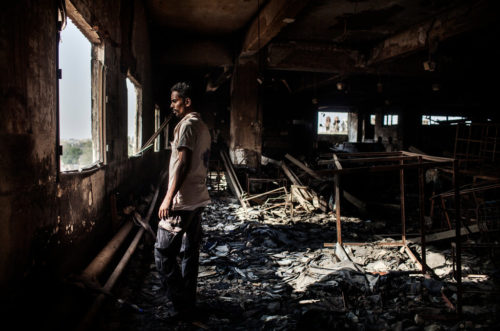The Ali Enterprises factory fire in Pakistan was the single deadliest factory fire in the history of modern garment production, killing 289 workers and injuring hundreds more. It was also the deadliest industrial accident in Pakistan’s history. The fire occurred just three weeks after the factory had been visited by inspectors from Social Accountability International (SAI), a multi stakeholder initiative (MSI) that specializes in certifying compliance with its own SA8000 standard. Despite the numerous safety hazards inside the Ali Enterprises factory, including a lack of proper fire exits, that would ultimately lead to the death of nearly 300 workers, SAI monitors certified the factory as safe.

The fire at Ali Enterprises killed nearly 300 people. The factory had been inspected and certified as safe just three weeks before the fire. Photo credit: Diego Ibarra Sanchez, New York Times.
The fire broke out on September 12, 2012, apparently as a result of a boiler explosion inside the factory, and flames spread quickly through the building. Workers fled to the factory’s main exit but they found it had been locked by managers, who were more concerned with saving the inventory than protecting workers’ lives. As a result, more than 600 workers who were inside at the time were forced to flee through a single exit, and nearly half of them did not make it out in time. Many of the workers who died perished as a result of smoke inhalation because the factory lacked the proper fire exits that would have prevented the deadly smoke from spreading throughout the building. Bars on the windows, inadequate fire safety equipment and a lack of fire safety training for the workforce exacerbated the problem.
But safety hazards weren’t the only problems that SAI monitors missed. According to the New York Times, workers at Ali Enterprises were paid just $58 per month, one third of the legal minimum wage and regularly worked 12-hour shifts. Many workers were reportedly never even registered as employees by the factory. Workers also told the NY Times that they “had been forced to lie about their working conditions to auditors representing foreign buyers.”
In the weeks leading up to the fire, two investigators from the RINA Group, an Italian firm hired by SAI to carry out the inspection, spent several days at the facility. SAI subsequently granted Ali Enterprises an SA8000 certification, indicating compliance with standards in eight areas, including health and safety, wages and working hours. The fact that SAI certified this factory as safe, despite very obvious and visible safety violations that contributed to workers’ deaths, is one of the most damning examples of the failure of corporate-led MSIs to protect workers’ rights. A New York Times exposé, published just a week after the fire, drew attention to these failures. As Richard Locke, a professor of political science at the M.I.T. Sloan School of Management pointed out, “Even after a decade or more of such private monitoring efforts, these programs – no matter how well funded or designed or how well trained their auditors are – simply do not in and of themselves produce sustained and significant improvements in labor standards in most supply chain factories.”
Unfortunately, SAI is not unique in its failure to ensure compliance with recognized labor rights standards. Along with Worldwide Responsible Accredited Production (WRAP), Verité, and the Fair Labor Association, to name a few, SAI bills itself as a multi stakeholder initiative that offers both corporations and non-profit organizations a seat at the table, presumably leading to monitoring outcomes that are more accurate and better for workers than traditional CSR programs. But MSIs feature many of the same fundamental flaws as CSR. They have governance structures that are controlled by major multinational corporations and are funded in large part by the very same brands whose factories they are hired to inspect. Because of this corporate influence, their monitoring programs are superficial at best, and lack any meaningful worker involvement. Perhaps most importantly, such organizations have no enforcement mechanism, so that even if violations are uncovered, neither the brand or the factory have any obligation or incentive to fix the problem.
Until such flaws are addressed, MSIs will continue to fail the very workers they are designed to protect. Though they pay lip service to workers’ concerns, SAI and others like it are structured in such a way that corporate profits will always take precedence over labor rights compliance. Corporations that are committed to genuine social responsibility must adopt a WSR approach; otherwise, we will continue to see disasters like the one that transpired at Ali Enterprises.
Now in Bangladesh, the Accord on Fire and Building Safety, a program exemplifying the principles of WSR, has made significant strides in addressing deadly safety hazards; unfortunately, no such program exists in Pakistan.